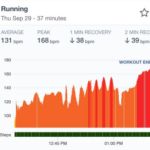
Debunking Common Diet Myths: What You Really Need to Know About Nutrition
Myth: Carbs are the enemy of weight loss

Carbohydrates often get a bad rap when it comes to weight loss. Many people believe that cutting out carbs entirely is the key to shedding pounds. However, not all carbs are created equal. Whole grains, fruits, and vegetables provide vital nutrients and fiber that are essential for a balanced diet. It’s more about choosing the right kind of carbs rather than eliminating them altogether.
Carbs serve as the body’s primary source of energy, especially for high-intensity activities. Restricting carbs too much can lead to low energy levels and even hinder performance during workouts. The key is to opt for complex carbohydrates like whole grains, legumes, and fruits, which provide sustained energy and keep you feeling full longer. Including a moderate amount of carbs in your diet can actually support weight loss by maintaining energy levels and preventing excessive snacking on unhealthy options.
Myth: Skipping meals helps in losing weight
Skipping meals is a common misconception believed to aid in weight loss. Many people think that by skipping meals, they are reducing their overall calorie intake and therefore promoting weight loss. However, this approach may actually have the opposite effect on the body. When meals are skipped, the body goes into a state of deprivation and starts to conserve energy by slowing down metabolism. This can lead to the body holding onto fat stores as a survival mechanism, making it harder to lose weight in the long run.
Moreover, skipping meals can also lead to negative effects on energy levels and overall well-being. When meals are missed, blood sugar levels can drop, resulting in fatigue, irritability, and difficulty concentrating. The body needs a constant source of energy from food to function optimally throughout the day. By skipping meals, one may experience a decrease in energy levels and find it challenging to engage in physical activity or make healthy food choices later on, which can hinder weight loss goals.
Myth: All calories are equal
When it comes to weight loss and overall health, not all calories are created equal. While it is true that calories are a unit of energy, the source of those calories plays a significant role in how they impact our bodies. For example, consuming 100 calories from a sugary drink will affect your body differently than eating 100 calories from a serving of vegetables. The quality of the calories, in terms of nutrients and satiety, is crucial in determining their effects on our metabolism and overall well-being.
Moreover, different types of calories can influence our hunger levels, hormonal response, and even metabolic rate. Foods that are high in fiber and protein, for instance, tend to keep us feeling fuller for longer periods compared to foods high in refined sugars or fats. This means that 100 calories from a protein-rich source can have a different impact on our bodies than 100 calories from a processed snack. Considering the nutritional value and composition of the calories we consume can be more beneficial than solely focusing on the quantity in our quest for optimal health and weight management.
Myth: Eating fat makes you fat
While it may seem intuitive to believe that consuming fat leads directly to weight gain, the truth is more complex. The body requires healthy fats for various functions, including hormone production, nutrient absorption, and cell structure. Consuming moderate amounts of healthy fats, such as those found in avocados, nuts, and olive oil, can actually support overall health and aid in weight management.
It’s important to distinguish between different types of fats, as not all fats are created equal. Trans fats and saturated fats found in processed and fried foods can indeed contribute to weight gain and health issues when consumed in excess. On the other hand, incorporating unsaturated fats, like those found in fish, seeds, and nuts, can provide essential nutrients while promoting satiety and supporting a healthy weight. Balancing fat intake along with a variety of nutrient-dense foods and regular physical activity is key to a well-rounded approach to maintaining a healthy lifestyle.
Myth: Detox diets are necessary for a healthy body
Detox diets have gained popularity in recent years, with many people believing that they are essential for maintaining a healthy body. These diets often involve consuming only liquids or specific foods for a certain period of time, with the promise of flushing out toxins and improving overall health. However, the idea that detox diets are necessary for a healthy body is actually a myth. Our bodies are well-equipped with organs such as the liver and kidneys that naturally detoxify and eliminate waste products on a daily basis. Following a balanced diet rich in fruits, vegetables, whole grains, and lean proteins is a more sustainable way to support our body’s detoxification processes.
While detox diets may lead to temporary weight loss due to calorie restriction, the weight loss is often not sustainable in the long run. In fact, some detox diets can be restrictive and may lack essential nutrients, leading to potential nutritional deficiencies. Additionally, rapid weight loss from detox diets can also result in muscle loss and a slower metabolism over time. Rather than relying on drastic measures like detox diets, focusing on long-term lifestyle changes such as regular exercise and a balanced diet is key to achieving and maintaining a healthy body weight.
Myth: Gluten-free diets are always healthier

Gluten-free diets have gained popularity in recent years, with many people opting to eliminate gluten from their meals in the belief that it will lead to better health. The myth that gluten-free diets are always healthier stems from the misconception that gluten is inherently harmful. While it is true that individuals with gluten intolerance or celiac disease must avoid gluten to prevent adverse health effects, for the general population, there is no conclusive evidence that going gluten-free offers any additional health benefits.
It is important to note that gluten-free products often contain higher amounts of sugar, fat, and additives to compensate for the lack of gluten, which can actually make them less healthy than their gluten-containing counterparts. Additionally, cutting out gluten without proper guidance from a healthcare professional or dietitian may result in nutrient deficiencies, as many gluten-containing products are fortified with essential vitamins and minerals. While some individuals may experience improved symptoms by avoiding gluten, it is crucial to approach a gluten-free diet with caution and make informed decisions based on individual health needs.
Myth: Eating late at night causes weight gain
Many people believe that eating late at night leads to weight gain because the body’s metabolism slows down during sleep. The idea is that consuming calories before bedtime will not give the body enough time to burn them off, thus resulting in weight gain. However, the key factor in weight management is not the time of day you eat, but rather the total amount of calories consumed versus calories expended throughout the day. Weight gain occurs when there is a surplus of calories consumed over time, regardless of when those calories are eaten.
Research has shown that the body’s metabolism functions continuously, even during sleep. While it is true that metabolic rate may slightly decrease during the night compared to the day, the overall impact on weight gain from eating late at night is not significant. What matters most is the total caloric intake and expenditure over a 24-hour period. It is more important to focus on the quality of food choices and portion sizes throughout the day, rather than fixating on the time you eat your meals.
Myth: You can spot reduce fat from specific areas
Spot reduction, the idea that you can selectively target fat loss from specific areas of your body, is a common misconception in the realm of fitness and weight loss. Many people believe that by doing exercises that target certain areas, such as crunches for a flat stomach or squats for toned thighs, they can magically melt away fat from those spots. However, the truth is that our bodies don’t work that way. When you lose weight, whether through diet or exercise, your body decides where it sheds fat from based on genetics and other factors, not on the specific exercises you do.
It’s important to understand that spot reduction is simply not a viable strategy for losing fat in targeted areas. Instead, focusing on overall weight loss through a combination of a healthy diet and regular exercise is the most effective way to see results. By creating a calorie deficit through a balanced approach, you can gradually reduce body fat levels throughout your entire body, leading to a more toned and lean appearance over time. Remember, patience and consistency are key when it comes to achieving lasting and sustainable results in your fitness journey.
Myth: Protein shakes are necessary for muscle growth
Protein shakes have gained popularity as a convenient way to increase protein intake, especially among individuals looking to build muscle. While protein is essential for muscle growth and repair, it is important to note that protein shakes are not a requirement for achieving muscle growth. In fact, whole food sources of protein such as meats, dairy products, legumes, and nuts can also effectively contribute to meeting one’s protein needs for muscle development.
Consuming a balanced diet that includes an adequate amount of protein from various sources can support muscle growth just as effectively as relying solely on protein shakes. It is essential to prioritize whole foods in one’s diet as they provide a wide range of nutrients that are beneficial for overall health and well-being. While protein shakes can be a convenient option for those who struggle to meet their protein requirements through whole foods alone, they are not a necessity for muscle growth and can be supplemented with a well-rounded diet.
Myth: You need to eat every 2-3 hours for a fast metabolism
Eating every 2-3 hours with the belief that it will speed up your metabolism is a common misconception. While it may seem intuitive that frequently eating keeps your metabolism active, the reality is that the frequency of meals does not impact your metabolic rate in a significant way. Your metabolism is mainly determined by factors such as age, genetics, muscle mass, and physical activity level, rather than how often you eat.
Research suggests that there is no concrete evidence to support the idea that eating every few hours enhances metabolism. The key to maintaining a healthy metabolism lies in consuming balanced meals, staying hydrated, getting regular physical activity, and ensuring you get an adequate amount of sleep. Rather than focusing on the timing of your meals, it is more important to pay attention to the quality and quantity of food you eat to support overall health and well-being.
Myth: Low-fat foods are always healthier

Low-fat foods have been touted as the healthier option for many years, with the belief that reducing fat intake leads to better overall health. However, this myth oversimplifies the complexities of nutrition. While some low-fat foods can be beneficial, not all low-fat products are automatically healthier. In fact, some low-fat foods may compensate for the lack of fat by adding extra sugar or artificial ingredients, which can be detrimental to health in the long run.
It’s important to remember that our bodies need healthy fats for various functions, including hormone regulation and absorption of fat-soluble vitamins. Restricting fat too much can lead to nutrient deficiencies and leave you feeling unsatisfied, leading to potential overeating of other less nutritious foods. Instead of focusing solely on low-fat options, it’s crucial to prioritize whole, nutrient-dense foods in balanced proportions to support overall well-being.
Myth: All sugar is bad for you
It is a common belief that all sugar is detrimental to health, leading to various health issues such as obesity and diabetes. However, not all sugars are created equal. Natural sugars found in fruits, vegetables, and dairy products come with essential nutrients and fiber that are beneficial for the body. It is the added sugars in processed foods and sugary beverages that are concerning, as they contribute to empty calories without any nutritional value.
Labeling all sugar as inherently bad overlooks the importance of moderation and mindful consumption. Small amounts of natural sugars can be part of a healthy diet, providing energy and enjoyment without causing harm when consumed in reasonable quantities. It is the excessive intake of added sugars that can lead to health problems, emphasizing the need to be mindful of the sources and quantities of sugar in our diets.
Myth: Eating small meals throughout the day boosts metabolism
Eating small meals throughout the day is a common myth believed to boost metabolism. The idea behind this myth is that by eating multiple small meals, you keep your metabolism constantly active, leading to more calorie burning. However, scientific research has shown that the impact of meal frequency on metabolism is quite minimal. What actually matters more for metabolism is the total amount of calories consumed and the composition of the diet.
In reality, the number of meals you eat per day has less influence on your metabolism than previously thought. Studies have found that the total daily caloric intake and the balance of macronutrients in your diet have a more significant effect on your metabolism. Focusing on a balanced diet that includes a combination of protein, carbohydrates, and fats, while being mindful of portion sizes, is more important for overall health and weight management than constantly snacking throughout the day.
Myth: Fad diets are the best way to lose weight
Fad diets often promise rapid and drastic weight loss results through extreme and often unsustainable eating patterns. These diets usually focus on eliminating specific food groups or drastically reducing calorie intake, which can lead to nutritional deficiencies and other health risks. While some fad diets may result in short-term weight loss, the weight is often quickly regained once normal eating patterns are resumed.
It’s important to remember that sustainable weight loss is achieved through a balanced diet and regular physical activity. Focusing on long-term lifestyle changes, such as incorporating more whole foods, practicing portion control, and finding enjoyable forms of exercise, is key to achieving and maintaining a healthy weight. By avoiding the pitfalls of fad diets and instead adopting a holistic approach to health and wellness, individuals can establish lifelong habits that support overall well-being.
Myth: Supplements are necessary for a balanced diet
Supplements have gained popularity as a quick fix for achieving optimal health and filling in nutrient gaps. However, the idea that supplements are essential for a balanced diet is a common misconception. While supplements can be beneficial in certain cases, they are not a substitute for a well-rounded and varied diet rich in fruits, vegetables, whole grains, lean proteins, and healthy fats. It is important to prioritize getting essential nutrients from whole foods whenever possible.
Relying solely on supplements for nutrients can lead to missing out on the complex interactions and benefits that whole foods provide. Whole foods contain a variety of essential nutrients, fiber, and phytochemicals that work synergistically to support overall health and well-being. Instead of depending on supplements, focus on incorporating a diverse range of nutrient-dense foods into your diet to ensure you are getting a wide array of vitamins, minerals, and antioxidants necessary for optimal health.
Myth: Vegan diets are always healthier than non-vegan diets

Vegan diets have gained popularity in recent years, with many people believing that they are inherently healthier than non-vegan diets. While a well-balanced vegan diet can indeed be very healthy, it is not automatically healthier than a diet that includes animal products. The key to a healthy diet, whether vegan or non-vegan, lies in eating a variety of nutrient-dense foods that provide essential vitamins, minerals, and macronutrients.
It is possible for individuals following a vegan diet to miss out on important nutrients such as vitamin B12, iron, omega-3 fatty acids, and protein if they are not careful with their food choices. On the other hand, non-vegan diets can also be healthy if they include a good balance of fruits, vegetables, whole grains, lean proteins, and healthy fats. Ultimately, the healthiness of a diet – whether vegan or non-vegan – depends on the overall food choices and nutritional balance rather than the exclusion or inclusion of specific food groups.
Myth: You need to cut out all carbs to lose weight
Many people believe that cutting out all carbohydrates is the key to weight loss. This myth stems from the idea that carbs are solely responsible for weight gain. However, the truth is that carbs are an essential macronutrient that provides energy to the body. While it is true that reducing the intake of refined carbs like sugary snacks and white bread can be beneficial for weight loss, completely eliminating all carbs from your diet is unnecessary and can have negative consequences on your health.
Carbohydrates are a vital source of energy for the body, especially for the brain and muscles. By consuming complex carbohydrates like whole grains, fruits, and vegetables, you can fuel your body with nutrients while supporting your weight loss goals. It is about making smart choices and opting for nutrient-dense carbs that provide sustained energy rather than empty calories from processed foods. Cutting out all carbs may lead to nutrient deficiencies and leave you feeling fatigued, making it harder to stick to a healthy lifestyle in the long run.
Myth: Eating healthy is too expensive
Many people believe that eating healthy is too expensive, but this myth can be debunked with a little bit of knowledge and planning. While it’s true that some health foods can be pricier than their processed counterparts, there are plenty of affordable options available. Buying in-season fruits and vegetables, opting for store-brand items, and purchasing whole foods in bulk can all help lower the cost of eating nutritiously. Additionally, planning meals ahead of time and cooking at home can also save money compared to dining out or buying pre-packaged meals.
It’s important to consider the long-term benefits of investing in your health through nutrition. By prioritizing nutrient-dense foods and cutting back on processed and convenience items, you may actually end up saving money in the long run by reducing healthcare costs and potential future health issues. While it may require some initial adjustments to your shopping habits and meal planning, eating healthy doesn’t have to break the bank. With a little creativity and resourcefulness, anyone can enjoy a balanced and nourishing diet without overspending.
Myth: You can eat whatever you want as long as you exercise
Consuming a balanced diet is crucial for overall health, particularly when it comes to weight management. While regular exercise is undoubtedly beneficial for physical well-being, it alone cannot offset the negative effects of consistently indulging in unhealthy foods. The concept of “eating whatever you want as long as you exercise” oversimplifies the complex relationship between diet and exercise in achieving and maintaining a healthy weight.
Furthermore, relying solely on exercise to counterbalance a poor diet can lead to nutrient deficiencies and other health issues in the long run. A diet high in processed foods, sugar, and unhealthy fats can contribute to various health conditions, regardless of how much exercise one engages in. It is essential to prioritize a well-rounded diet that includes a variety of nutrients to support overall health and well-being, in conjunction with a consistent exercise routine.
Myth: Juicing is the best way to detoxify your body
Juicing has gained popularity as a trendy way to detoxify the body and cleanse toxins. The idea behind juicing is to consume a variety of fruits and vegetables in liquid form, which is believed to help in eliminating harmful substances and promoting overall health. Proponents of juicing claim that it can boost energy levels, improve digestion, and support the body’s natural detoxification processes.
However, it is essential to approach juicing with caution and not solely rely on it as the best way to detoxify the body. While juices can provide essential vitamins and minerals, they often lack the fiber found in whole fruits and vegetables. Fiber plays a crucial role in regulating digestion and promoting the excretion of toxins from the body. Additionally, some juice cleanses may be high in sugar content, which can lead to fluctuations in blood sugar levels and potentially negate any detoxifying benefits.
• Juicing can be a convenient way to increase intake of fruits and vegetables
• Lack of fiber in juices may affect digestion and toxin elimination
• Some juice cleanses may contain high sugar content, impacting blood sugar levels












